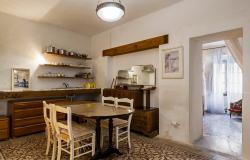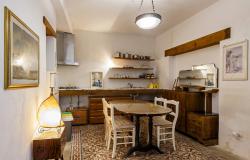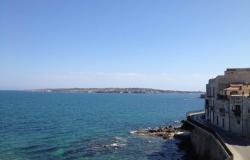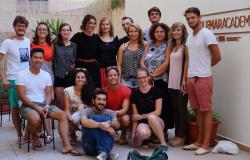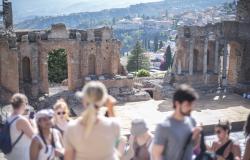Words by Pat Eggleton
Nelson is the kind of English hero whose exploits used to fill schoolbooks and “Boys’ Own” annuals and, although many British people today know little about him, he is a hero of whom we are rather protective. I think he looks a bit lonely up there on his column in Trafalgar Square so I always go to say “Hello” to him when I am in London. And one day, in Sicily, I decided to seek out the Nelson Castle at Maniace, near the town of Bronte.
Bronte lies about 37 miles northwest of Catania, tucked away in the shadow of Etna, and its dukedom was bestowed upon Admiral Horatio Nelson by a grateful King Ferdinando [III of Sicily and IV of Naples] in 1799. Guidebooks will tell you that the Castle is here, but it is a little further on at Maniace. The Castle is a former Benedictine Abbey.
I should like to be able to tell you that England's saviour rested here in the sun with his great love, Emma Hamilton - and many Sicilians believe that he did - but, alas, he never saw his Castle. The first of his descendants to arrive was his niece Charlotte, who, after a truly nightmarish journey, decided that it was not to her taste and stayed only three days. It was later used by other members of the family but under agrarian reform in Italy in 1961 much of the land was redistributed. The Nelson family sold the castle and park to the Comune of Bronte in 1981.
 There may, however, be another British connection and this is a theory that I like very much: In 1802 the Reverend Patrick Prunty or Brunty, father of another Charlotte plus Emily, Anne and Branwell, changed his name to Brontë in 1802. He admired Nelson and it is possible that he did this as a homage to the Admiral then added the diaeresis for effect. The dates tally and I, for one, believe the story. I like to think that there is a connection between Sicily and the three doomed, writing sisters and that poor, bereaved Mr Brontë found some comfort in his surname. I often wonder what, if anything, he knew of the town in far-away, sunny Sicily with which he shared it.
There may, however, be another British connection and this is a theory that I like very much: In 1802 the Reverend Patrick Prunty or Brunty, father of another Charlotte plus Emily, Anne and Branwell, changed his name to Brontë in 1802. He admired Nelson and it is possible that he did this as a homage to the Admiral then added the diaeresis for effect. The dates tally and I, for one, believe the story. I like to think that there is a connection between Sicily and the three doomed, writing sisters and that poor, bereaved Mr Brontë found some comfort in his surname. I often wonder what, if anything, he knew of the town in far-away, sunny Sicily with which he shared it.
 Upon entering the grounds of the Castle, you will be surprised at the incongruous sight of a Celtic cross. This was erected in 1888 in honour of Nelson. To your right is the Castle’s Norman Church, dating back to 1173. There are knowledgeable guides with good English to take you around the interior and the tour is included in the entrance fee. My guide even refused a tip! The Castle has a large park so you could easily spend a day there.
Upon entering the grounds of the Castle, you will be surprised at the incongruous sight of a Celtic cross. This was erected in 1888 in honour of Nelson. To your right is the Castle’s Norman Church, dating back to 1173. There are knowledgeable guides with good English to take you around the interior and the tour is included in the entrance fee. My guide even refused a tip! The Castle has a large park so you could easily spend a day there.
 The Castle’s gallery displays many mementoes of Nelson, among them a decanter and glasses which were used on the “Victory” on the eve of the Battle of Trafalgar. Also on display is a letter from Queen Elizabeth 11 in which she invites members of the Nelson family to her Coronation.
The Castle’s gallery displays many mementoes of Nelson, among them a decanter and glasses which were used on the “Victory” on the eve of the Battle of Trafalgar. Also on display is a letter from Queen Elizabeth 11 in which she invites members of the Nelson family to her Coronation.
 Near the Castle there is a tiny English cemetery which visitors cannot enter as it is private and still belongs to the Nelson family. It is at the side of the Maniace cemetery and contains the graves of the fifth and sixth Dukes of Bronte, the fifth Duke's brother, three administrators, one servant and the Scottish poet William Sharp, who died during a visit to the Castle. Three Italians who were killed during World War II are also buried there.
Near the Castle there is a tiny English cemetery which visitors cannot enter as it is private and still belongs to the Nelson family. It is at the side of the Maniace cemetery and contains the graves of the fifth and sixth Dukes of Bronte, the fifth Duke's brother, three administrators, one servant and the Scottish poet William Sharp, who died during a visit to the Castle. Three Italians who were killed during World War II are also buried there.
 I found little to do in the town of Bronte itself, although it is pleasant enough. There were plenty of souvenirs of Etna on sale but no mementoes of the Castle. I did, however, find a couple of interesting books about it. A food speciality of Bronte is sausages made from cinghiale [wild boar] meat but I discovered that you have to order these from a butcher in advance. Pistachio nuts, for which Bronte is also famous, abound and, although I can buy pistacchi di Bronte easily enough in Modica, there is something that still thrills me about buying food close to its source of production.
I found little to do in the town of Bronte itself, although it is pleasant enough. There were plenty of souvenirs of Etna on sale but no mementoes of the Castle. I did, however, find a couple of interesting books about it. A food speciality of Bronte is sausages made from cinghiale [wild boar] meat but I discovered that you have to order these from a butcher in advance. Pistachio nuts, for which Bronte is also famous, abound and, although I can buy pistacchi di Bronte easily enough in Modica, there is something that still thrills me about buying food close to its source of production.
A journey from Modica to Bronte or Maniace cannot be accomplished in a day by public transport, nor could the most intrepid tourist reach Maniace from Bronte other than by car. Public transport access to tourist sites is an aspect of tourism that many areas of Sicily still need to sort out. But I can tell you that a visit to the Castello di Maniace is well worth the effort for it is like finding a corner of England in Sicily.



